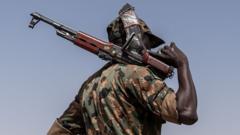In the aftermath of a deadly military conflict between India and Pakistan, the family of Mohammad Iqbal, an Indian teacher killed in shelling, confronts the painful fallout of being labeled a "terrorist" by media outlets. Despite the police refuting the claims, the spreading of misinformation continues to add to their grief.
Misinformation Follows Tragedy: Family of Indian Teacher Decries False Terrorism Claims

Misinformation Follows Tragedy: Family of Indian Teacher Decries False Terrorism Claims
The family of Mohammad Iqbal, who lost his life in cross-border shelling, faces further anguish after misleading media narratives label him a terrorist.
In a tragic turn of events, Mohammad Iqbal, a dedicated teacher in Poonch, Indian-administered Kashmir, was killed on May 7 amid escalating cross-border shelling. His death occurred just one day after India executed airstrikes in Pakistan and Pakistan-administered Kashmir, responding to a militant attack that claimed 26 lives in Pahalgam, although Pakistan denied any involvement in the incident.
Farooq Ahmed, Iqbal's brother, recounts the anger and dismay that followed Iqbal's death, as media outlets hastily branded him a "terrorist" based solely on his religious appearance. "My brother was a teacher, but they saw his beard and skullcap and painted him as a terrorist," Farooq expressed. This labeling added a layer of tragedy to an already devastating loss. Indian officials reported that Iqbal was among 16 casualties during this period of conflict, while Pakistan has claimed civilian deaths amounting to 40, though the exact figures remain disputed.
The media frenzy surrounding the conflict gave rise to a disinformation battleground, with an avalanche of erroneous claims flooding social media and traditional channels alike. One notorious falsehood involved a fabricated claim that India had destroyed Pakistan's Karachi port, which Indian officials later contradicted. Manisha Pande, managing editor of Newslaundry, noted the unprecedented intensity of misinformation covering the conflict, highlighting how this sensationalism marred the narrative.
As the wider conflict unraveled, the Ahmed family grappled with the loss of Iqbal as they learned of the media's labeling of him as a terrorist posthumously. The family was initially busy with mourning rituals; it wasn't until a relative shared a WhatsApp video that they were shocked by the misleading portrayal of Iqbal. His image appeared on prominent news networks claiming he was killed during an "attack on a terrorist camp," forcing the family into damage control.
Acknowledging the public outcry, Poonch police swiftly issued a statement asserting that Iqbal was a respected figure with no ties to terrorism. They vowed legal action against any media disseminating false narratives. However, Farooq contends that the damage had already been done. "By then, the false claim would've already reached millions in India," he laments.
The family is still trying to process their loss, with Iqbal being the sole breadwinner, leaving behind two wives and eight children. “The government compensation won't sustain us long. We have to start planning our future,” remarked Farooq. Despite the family's attempts to fight back against the unfounded claims that perpetuated through news cycles, the stigma endures. As they grapple with the social ramifications of misinformation, they question how to convey their suffering to a world that may recognize Iqbal as a terrorist rather than as a loving husband and father.




















